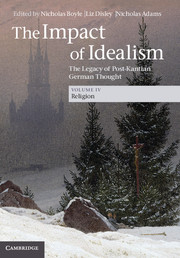Book contents
- Frontmatter
- Contents
- List of Contributors
- Acknowledgements
- List of Abbreviations
- Introduction: the impact of Idealism on religion
- 1 The impact of Idealism on Christology: from Hegel to Tillich
- 2 German Idealism's Trinitarian legacy: the nineteenth century
- 3 German Idealism's Trinitarian legacy: the twentieth century
- 4 Kierkegaard, Hegelianism and the theology of the paradox
- 5 Biblical hermeneutics: from Kant to Gadamer
- 6 Aesthetic Idealism and its relation to theological formation: reception and critique
- 7 The autonomy of theology and the impact of Idealism: from Hegel to radical orthodoxy
- 8 Faith and reason
- 9 Rabbinic Idealism and Kabbalistic realism: Jewish dimensions of Idealism and Idealist dimensions of Judaism
- 10 ‘In the arms of gods’: Schelling, Hegel and the problem of mythology
- 11 Dialectic and analogy: a theological legacy
- Bibliography
- Index
- References
4 - Kierkegaard, Hegelianism and the theology of the paradox
Published online by Cambridge University Press: 05 December 2013
- Frontmatter
- Contents
- List of Contributors
- Acknowledgements
- List of Abbreviations
- Introduction: the impact of Idealism on religion
- 1 The impact of Idealism on Christology: from Hegel to Tillich
- 2 German Idealism's Trinitarian legacy: the nineteenth century
- 3 German Idealism's Trinitarian legacy: the twentieth century
- 4 Kierkegaard, Hegelianism and the theology of the paradox
- 5 Biblical hermeneutics: from Kant to Gadamer
- 6 Aesthetic Idealism and its relation to theological formation: reception and critique
- 7 The autonomy of theology and the impact of Idealism: from Hegel to radical orthodoxy
- 8 Faith and reason
- 9 Rabbinic Idealism and Kabbalistic realism: Jewish dimensions of Idealism and Idealist dimensions of Judaism
- 10 ‘In the arms of gods’: Schelling, Hegel and the problem of mythology
- 11 Dialectic and analogy: a theological legacy
- Bibliography
- Index
- References
Summary
In the decades following the First World War, there emerged first in Germany and France, and then spreading outward, what has aptly been called a Kierkegaard ‘craze’ in which the Danish thinker Søren Kierkegaard (1813–55) was excavated from his relative obscurity and heralded in an era of deep cultural malaise as a ‘protesting’ thinker on one hand, and as a ‘rousing’ thinker on the other. With respect to the former, Kierkegaard was supposed to protest against the absolute Idealism of G. W. F. Hegel (1770–1831), a philosophy of evolutionary necessity, which, in the words of Michael Theunissen, ‘identifies the beginning as the wrapped-up end and the end as the unwrapped beginning’. With respect to the latter, Kierkegaard is said to rouse readers about ‘existentialism’. But what is existentialism? Generally, it is characterised as the philosophical commitment to understanding oneself subjectively in life's concrete, contingent and ultimately absurd specificity, instead of pursuing the always-elusive universal knowledge of a totalising objective metaphysical system. Kierkegaard – in the pseudonymous works Fear and Trembling, The Concept of Anxiety, Concluding Unscientific Postscript and The Sickness unto Death, among others – is often reckoned to be the father of this existentialism, a distinctively modern philosophical tradition in which figures as otherwise diverse as Karl Jaspers, Martin Heidegger, Gabriel Marcel and Jean-Paul Sartre were all supposed to be related. Kierkegaard's prioritisation of subjectivity over objectivity, along with his rejection of the alleged abstractions of Hegelianism, was embraced by those who regarded the most important questions of philosophy as bearing not on the philosophy of history, the identity of meaning and being or absolute knowing, but rather on the concrete actuality of existing human beings. His analyses of such affective dimensions of human experience as anxiety, boredom and despair were supposed to signal a decisive break with philosophical traditions that regarded reason as the principal psychological faculty. Such analyses chimed well with the phenomenology of twentieth-century existentialists, just as Kierkegaard's emphasis on the importance of freely choosing oneself in one's concrete existence harmonised with their discussions of human authenticity.
- Type
- Chapter
- Information
- The Impact of IdealismThe Legacy of Post-Kantian German Thought, pp. 91 - 113Publisher: Cambridge University PressPrint publication year: 2013



